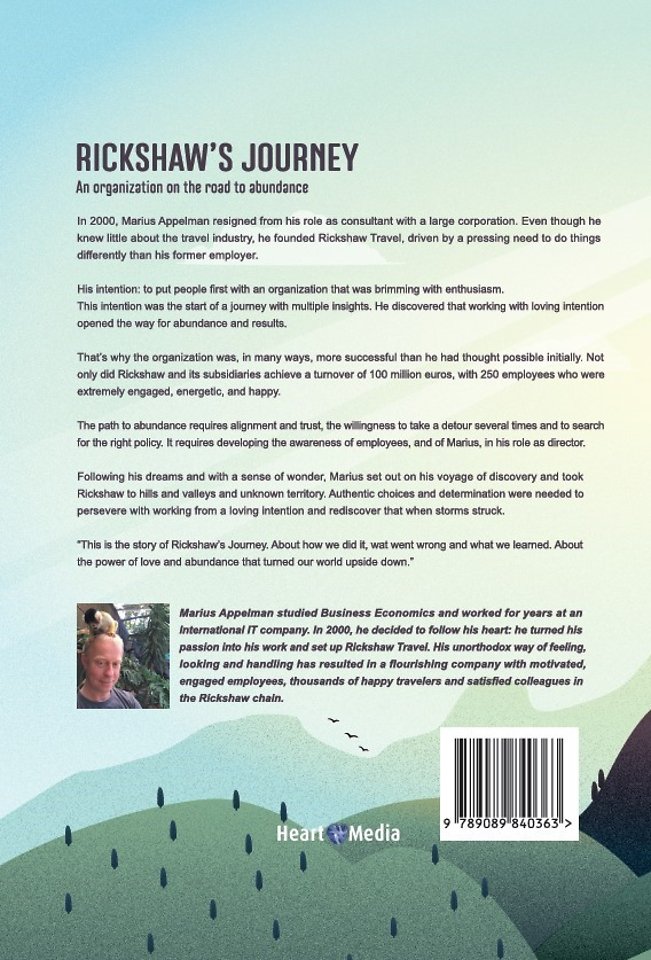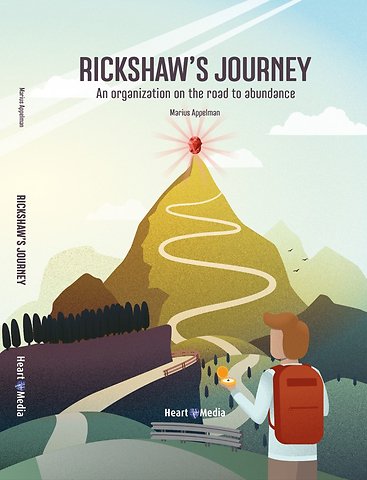



Marius Appelman studeerde Bedrijfseconomie en werkte jarenlang bij een internationaal IT bedrijf. In 2000 besloot hij zijn hart te volgen; hij maakte van zijn passie zijn vak en startte Riksja Travel.
Hij ondekte hoe je met een liefdevolle intentie en een beleid gericht op geven overvloed kunt bereiken in een bedrijf. Zie het boek Riksja's Journey; met een organisatie op weg naar overvloed.
Meer over Marius AppelmanRickshaw’s Journey
An Organization on the road to abundance
Gebonden Engels 2024 1e druk 9789089840363Samenvatting
In 2000, Marius Appelman resigned from his role as consultant with a large corporation. Even though he knew little about the travel industry, he founded Rickshaw Travel, driven by a pressing need to do things differently than his former employer. His intention: to put people first with an organization that was brimming with enthusiasm. This intention was the start of a journey with multiple insights. He discovered that working with loving intention opened the way for abundance and results. That's why the organization was, in many ways, more successful than he had thought possible initially. Not only did Rickshaw and its subsidiaries achieve a turnover of 100 million euros, with 250 employees who were extremely engaged, energetic, and happy.
The path to abundance requires alignment and trust, the willingness to take a detour several times and to search for the right policy. It requires developing the awareness of employees, and of Marius, in his role as director. Following his dreams and with a sense of wonder, Marius set out on his voyage of discovery and took Rickshaw to hills and valleys and unknown territory. Authentic choices and determination were needed to persevere with working from a loving intention and rediscover that when storms struck.
'This is the story of Rickshaw's Journey. About how we did it, wat went wrong and what we learned. About the power of love and abundance that turned our world upside down'.
Trefwoorden
Specificaties
Lezersrecensies
Inhoudsopgave
Part 1 The mental dimension 15
1.1 Introduction 16
1.2 Choosing the right concept 21
1.3 Choosing the right business model
1.4 Choosing meaning 28
1.5 Choosing abundance 37
1.6 Choosing to add value 48
1.7 Choosing trust 52
1.8 Choosing people over rules, procedures, and agreements 57
1.9 Choosing constructive realism 65
1.10 Choosing to think ahead and continuously innovate 69
Part 2 The social dimension 74
2.1 Introduction 85
2.2 The bed 77
2.3 The current: Motivation 84
2.4 The boats: Teams 95
2.5 The Admiralty: Leadership 108
2.6 The delta: International cooperation: 123
2.7 In conclusion: Capture the social dimension in a story 130
Part 3 The physical organization 131
3.1 Introduction 132
3.2 Start up 135
3.3 Cellular Structure 141
3.4 Self steering organization 146
3.5 Innovation 152
3.6 The sustainabale organization 156
3.7 The new start-up attitude 161
3.8 The (Post-) Covid organization 163
Part 4 The spiritual dimension 170
4.1 Introduction 171
4.2 Awareness and abundance 173
4.3 Paradigms: !e tunnels we are in 176
4.4. Working intuitively 185
4.5 Employee awareness 191
In conclusion: An organization on the road to abundance 199
Appendix 1: !e Rickshaw Quest approach 208
Appendix 2: Rickshaw’s value system 213
Acknowledgments 218
References 220
Heart Media Group 222
Anderen die dit boek kochten, kochten ook
Rubrieken
- advisering
- algemeen management
- coaching en trainen
- communicatie en media
- economie
- financieel management
- inkoop en logistiek
- internet en social media
- it-management / ict
- juridisch
- leiderschap
- marketing
- mens en maatschappij
- non-profit
- ondernemen
- organisatiekunde
- personal finance
- personeelsmanagement
- persoonlijke effectiviteit
- projectmanagement
- psychologie
- reclame en verkoop
- strategisch management
- verandermanagement
- werk en loopbaan





